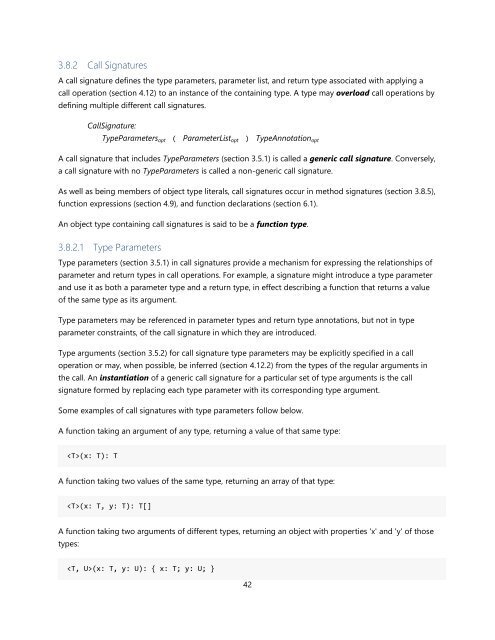TypeScript Language Specification v1.5
TypeScript Language Specification v1.5
TypeScript Language Specification v1.5
Create successful ePaper yourself
Turn your PDF publications into a flip-book with our unique Google optimized e-Paper software.
3.8.2 Call Signatures<br />
A call signature defines the type parameters, parameter list, and return type associated with applying a<br />
call operation (section 4.12) to an instance of the containing type. A type may overload call operations by<br />
defining multiple different call signatures.<br />
CallSignature:<br />
TypeParameters opt ( ParameterList opt ) TypeAnnotation opt<br />
A call signature that includes TypeParameters (section 3.5.1) is called a generic call signature. Conversely,<br />
a call signature with no TypeParameters is called a non-generic call signature.<br />
As well as being members of object type literals, call signatures occur in method signatures (section 3.8.5),<br />
function expressions (section 4.9), and function declarations (section 6.1).<br />
An object type containing call signatures is said to be a function type.<br />
3.8.2.1 Type Parameters<br />
Type parameters (section 3.5.1) in call signatures provide a mechanism for expressing the relationships of<br />
parameter and return types in call operations. For example, a signature might introduce a type parameter<br />
and use it as both a parameter type and a return type, in effect describing a function that returns a value<br />
of the same type as its argument.<br />
Type parameters may be referenced in parameter types and return type annotations, but not in type<br />
parameter constraints, of the call signature in which they are introduced.<br />
Type arguments (section 3.5.2) for call signature type parameters may be explicitly specified in a call<br />
operation or may, when possible, be inferred (section 4.12.2) from the types of the regular arguments in<br />
the call. An instantiation of a generic call signature for a particular set of type arguments is the call<br />
signature formed by replacing each type parameter with its corresponding type argument.<br />
Some examples of call signatures with type parameters follow below.<br />
A function taking an argument of any type, returning a value of that same type:<br />
(x: T): T<br />
A function taking two values of the same type, returning an array of that type:<br />
(x: T, y: T): T[]<br />
A function taking two arguments of different types, returning an object with properties 'x' and 'y' of those<br />
types:<br />
(x: T, y: U): { x: T; y: U; }<br />
42


















